Overview
The article addresses a critical question: how can candidates effectively articulate their reasons for wanting to work at a particular organization during interviews? It emphasizes the necessity of aligning personal values with the company’s mission, illustrating industry knowledge, and employing structured storytelling techniques—such as the STAR method—to craft compelling narratives that resonate with interviewers. This approach significantly increases the likelihood of securing a job offer.
Key Highlights:
- Organizations using applicant tracking systems (ATS) achieve hiring outcomes 2-3 times better than those that do not, highlighting the importance of personalized recruitment.
- Boutique Recruiting specializes in tailored recruitment solutions, fostering long-term relationships between candidates and employers.
- Personalized recruitment enhances employee satisfaction and contributes to organizational success by improving talent retention and performance.
- Researching an organization’s mission and values before interviews helps candidates align their responses and demonstrate genuine interest.
- Statistics show employees with aligned values are significantly more satisfied and engaged in their roles.
- Candidates should transparently communicate their workstyle preferences and motivations during interviews to build rapport with hiring managers.
- Using the STAR method (Situation, Task, Action, Result) can effectively showcase how candidates’ skills align with job requirements.
- Candidates who practice their responses report increased confidence and clarity, improving their chances of securing a job.
- Demonstrating industry knowledge, including awareness of organizational leadership and recent achievements, can significantly enhance a candidate’s appeal.
- Aligning personal career aspirations with the organization’s growth trajectory reassures employers of a candidate’s commitment to long-term success.
- Sharing personal stories that connect with the organization’s mission can create memorable impressions during interviews.
Introduction
In the competitive landscape of job searching, candidates are not merely seeking employment; they are embarking on a quest for meaningful connections that resonate with their career aspirations and personal values.
- Boutique Recruiting distinguishes itself by offering tailored recruitment solutions that prioritize the unique needs of both candidates and employers, fostering relationships that extend beyond mere job placements.
- This article explores essential strategies candidates can employ to enhance their interview performance—from researching company values to crafting compelling narratives that resonate with hiring managers.
- By understanding and addressing the specific challenges of each role, candidates can position themselves not only as qualified applicants but also as valuable assets poised to contribute to organizational success.
Boutique Recruiting: Tailored Recruitment Solutions for Your Career Goals
In today’s competitive job market, organizations utilizing applicant tracking systems (ATS) achieve hiring outcomes that are 2-3 times better than those that do not. This statistic underscores the critical importance of personalized recruitment services, especially in the financial sector. Boutique Recruiting excels in connecting high-quality individuals with employers across diverse industries by offering tailored recruitment solutions. This approach emphasizes a profound comprehension of the distinct requirements of both applicants and employers, ensuring that placements extend beyond simply filling roles; they cultivate enduring relationships.
The significance of personalized recruitment cannot be overstated. Such strategies not only enhance employee satisfaction but also contribute significantly to organizational success. By focusing on the specific requirements of each role and the culture of the hiring organization, Boutique Recruiting effectively addresses the critical challenge of finding the right talent. This ultimately leads to improved retention and performance. Have you considered how your recruitment strategies align with the unique challenges of sourcing top talent in the financial industry?
Client testimonials highlight the effectiveness and value of Boutique Recruiting’s custom recruitment solutions. Clients praise the team’s ability to understand their business needs and deliver quality candidates quickly. Furthermore, insights from the case study titled “Seamless Integration – Custom Recruitment Software with Existing HR Systems” illustrate how integrating tailored recruitment solutions with existing HR systems can optimize hiring processes. This comprehensive approach, including key UX principles, ensures that Boutique Recruiting not only meets but exceeds the expectations of Financial Firm HR Managers.
Are you ready to transform your hiring process? Reach out to Boutique Recruiting today for a consultation and discover how our personalized recruitment services can elevate your organization’s success.
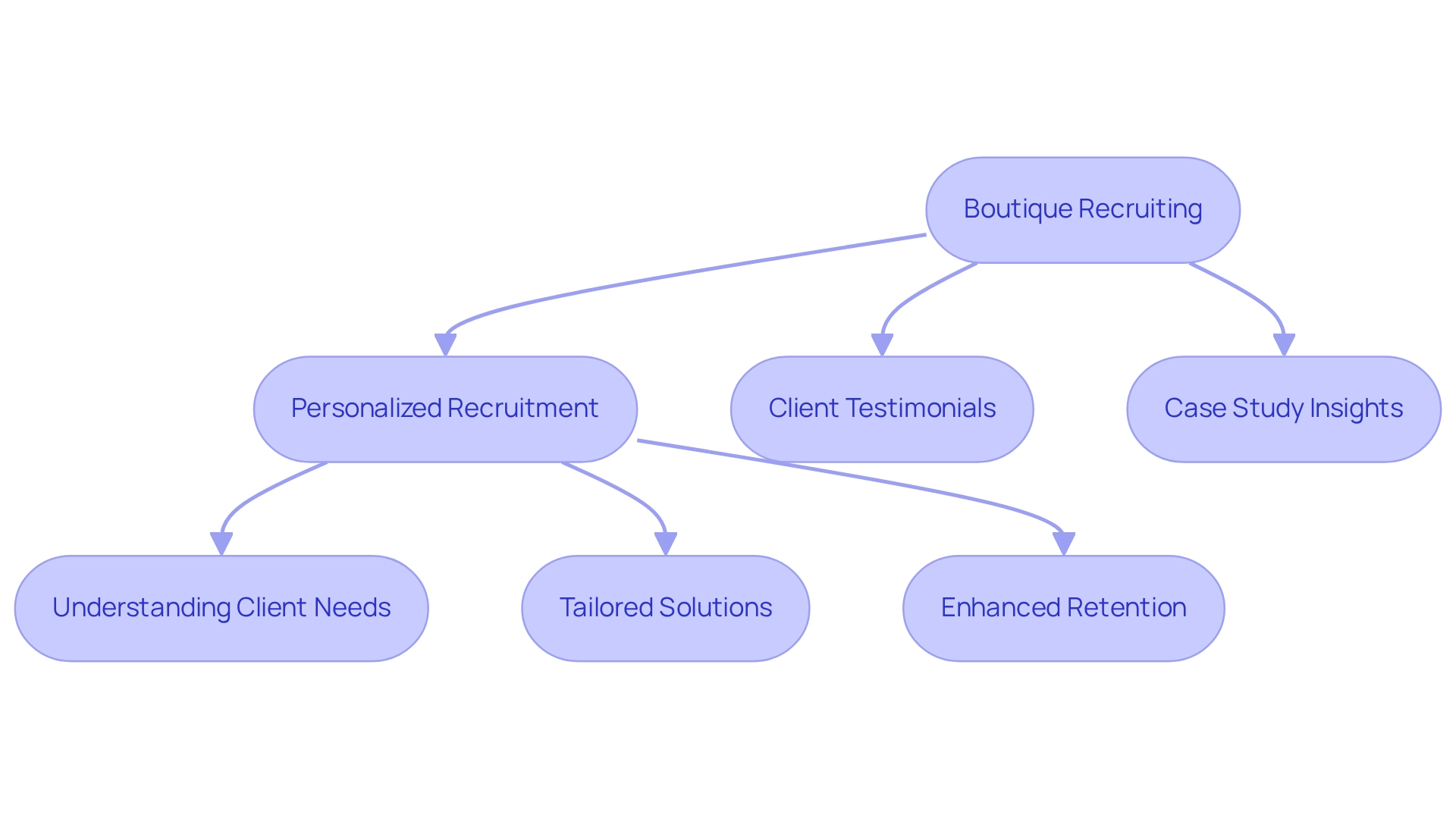
Research the Company: Align Your Values with Their Mission
Before your interview, invest time in researching the organization’s mission, values, and culture. This understanding empowers you to tailor your responses, providing answers for why you want to work here by showcasing how your personal values resonate with theirs. Such alignment not only reflects your genuine interest in the role but also suggests that you are likely to thrive within their organizational environment.
Statistics indicate that employees who believe their values correspond with their organization’s are significantly more satisfied and engaged in their roles. This is emphasized by the VIA (Values in Action) Character Strengths Inventory, which identifies six virtues and 24 strengths that contribute to this alignment. Furthermore, case studies suggest that many employees contemplate departing if their employer collaborates with partners whose values clash with their own. This underscores the necessity for individuals to verify that their personal values align with the organization’s mission.
Dr. William J. Mayo highlights the importance of this alignment, stating, “The continuing pursuit of the ideal of service over profit; primary concern for the care and welfare of each patient; and the continuing interest by every member of the organization in the professional progress of every other member.” This illustrates how aligning personal values with company culture enhances both job satisfaction and retention.
Moreover, applicants should embrace transparency during discussions by being open about their workstyle preferences, whether they favor hybrid, on-site, or remote work setups, alongside their salary expectations and any distinctive personal situations. By effectively communicating your shared values and being honest about your motivations, you can offer answers for why you want to work here, positioning yourself as a strong fit for the organization and paving the way for a successful career.
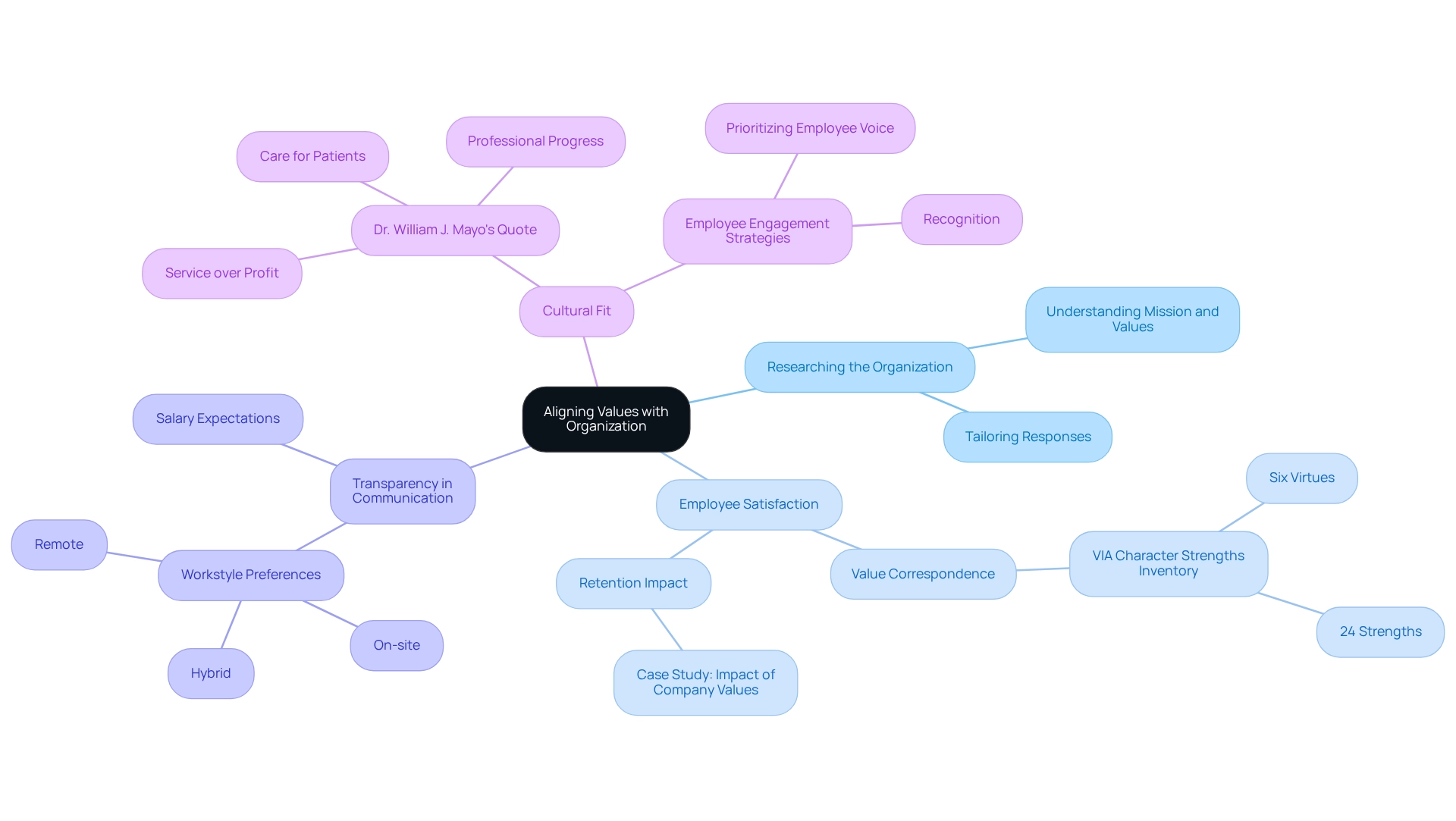
Connect Personal Motivations: Show Enthusiasm for the Role
When articulating your answers for why you want to work here, it is crucial to connect your personal motivations to the specific role. Highlight particular aspects of the position that genuinely excite you and explain how they align with your career aspirations. This approach not only demonstrates your enthusiasm but also allows interviewers to envision your potential fit within the team and the broader organization.
Consider this: studies show that individuals who demonstrate sincere enthusiasm are considerably more prone to obtain job offers; indeed, those who had a favorable discussion experience are 38% more inclined to accept an offer. Furthermore, 80% of job seekers have opted out of offers due to poor interview experiences, underscoring the necessity of preparation and a positive presentation. Moreover, 1 in 5 applicants have declined a job offer due to the prolonged wait for its arrival, emphasizing the significance of prompt communication in the recruitment process.
To effectively convey your enthusiasm, consider sharing a personal story that illustrates your passion for the industry or the specific role. For instance, if you’re applying for a position in finance, you might discuss how your interest in financial markets developed during your studies or through a relevant internship. This personal touch not only makes your response memorable but also reinforces your commitment to the role.
Furthermore, candidates should keep in mind that the first job offer might not always be the best. Exploring multiple opportunities can reveal roles that better align with long-term aspirations and professional growth. Interacting with different organizations can also uncover advantages and advancement opportunities that may not be obvious initially. Statistics reveal that 56% of job applicants encounter technical difficulties during the application process, which can detract from their enthusiasm. By preparing thoroughly and ensuring a smooth application experience, you can focus on showcasing your genuine interest during interviews. Remember, providing clear answers for why you want to work here can significantly impact hiring choices, as individuals who align their personal goals with the company’s mission are often seen as more valuable assets. As Niels Rozemeijer observed, “65% of satisfied applicants are likely to do business with you again,” highlighting the long-term advantages of positive experiences for applicants.
In summary, connecting your personal motivations to the job role is essential. It not only emphasizes your enthusiasm but also establishes you as an individual who is not only qualified but also truly committed to contributing to the organization’s success.
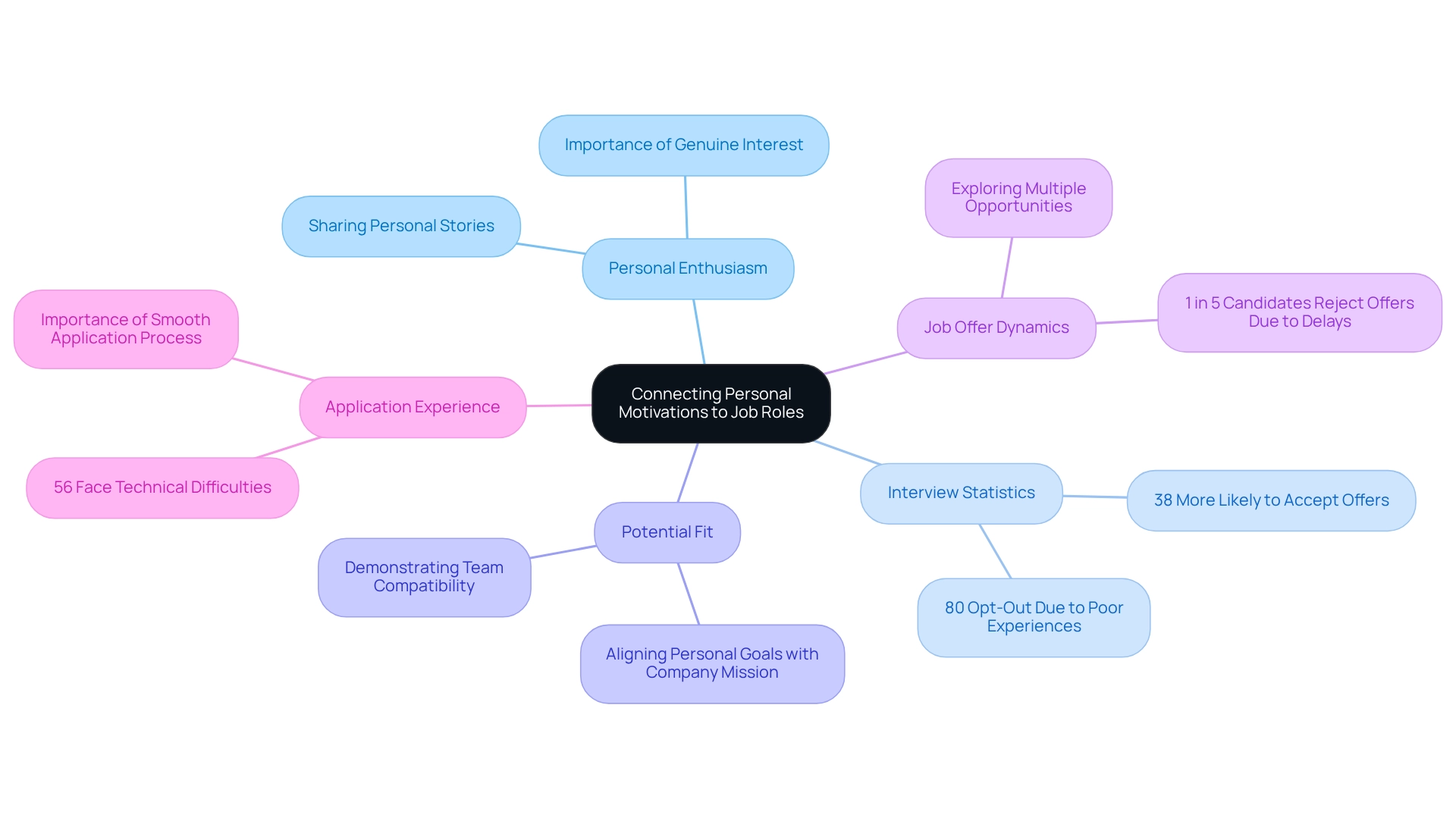
Craft a Compelling Narrative: Align Skills with Company Needs
To effectively convey your suitability for a role, develop a narrative that highlights your skills and experiences in relation to the job requirements. Utilizing the STAR method—Situation, Task, Action, Result—can significantly enhance your responses. This structured approach allows you to clearly articulate how your background aligns with the company’s needs, making your answers not only more engaging but also more persuasive.
In today’s competitive hiring landscape, where there is a war for talent, mastering the STAR technique is crucial. Studies indicate that individuals who excel in this approach are more equipped for behavioral assessments, which are increasingly favored by recruiters. Notably, 38 percent of recruiters dedicate 1-2 hours arranging discussions for one individual, underscoring the necessity for applicants to distinguish themselves through effective storytelling. Furthermore, leading candidates are not merely seeking any position; they are evaluating whether the organization aligns with their professional goals and watching for warning signs during the selection process. This reality emphasizes the importance of a seamless selection process by hiring managers.
Consider the example of Girls Code, which recognized the gender gap in technology as a pressing issue. They implemented coding workshops that addressed this situation (Situation), tasked themselves with enhancing skills and confidence (Task), took action by conducting the workshops (Action), and ultimately observed improved skills and confidence among participants (Result). This initiative exemplifies how a clear narrative surrounding a problem, intervention, and outcome can resonate with hiring managers while adhering to the STAR framework.
Expert advice suggests that when crafting your narrative, focus on specific examples that demonstrate your skills in action. This approach not only showcases your qualifications but also illustrates your understanding of the company’s culture and needs. By aligning your experiences with the organization’s objectives and acknowledging the significance of tailored recruitment, you enhance your chances of leaving a lasting impression during the selection process, especially as applicants seek answers for why you want to work here while being evaluated.
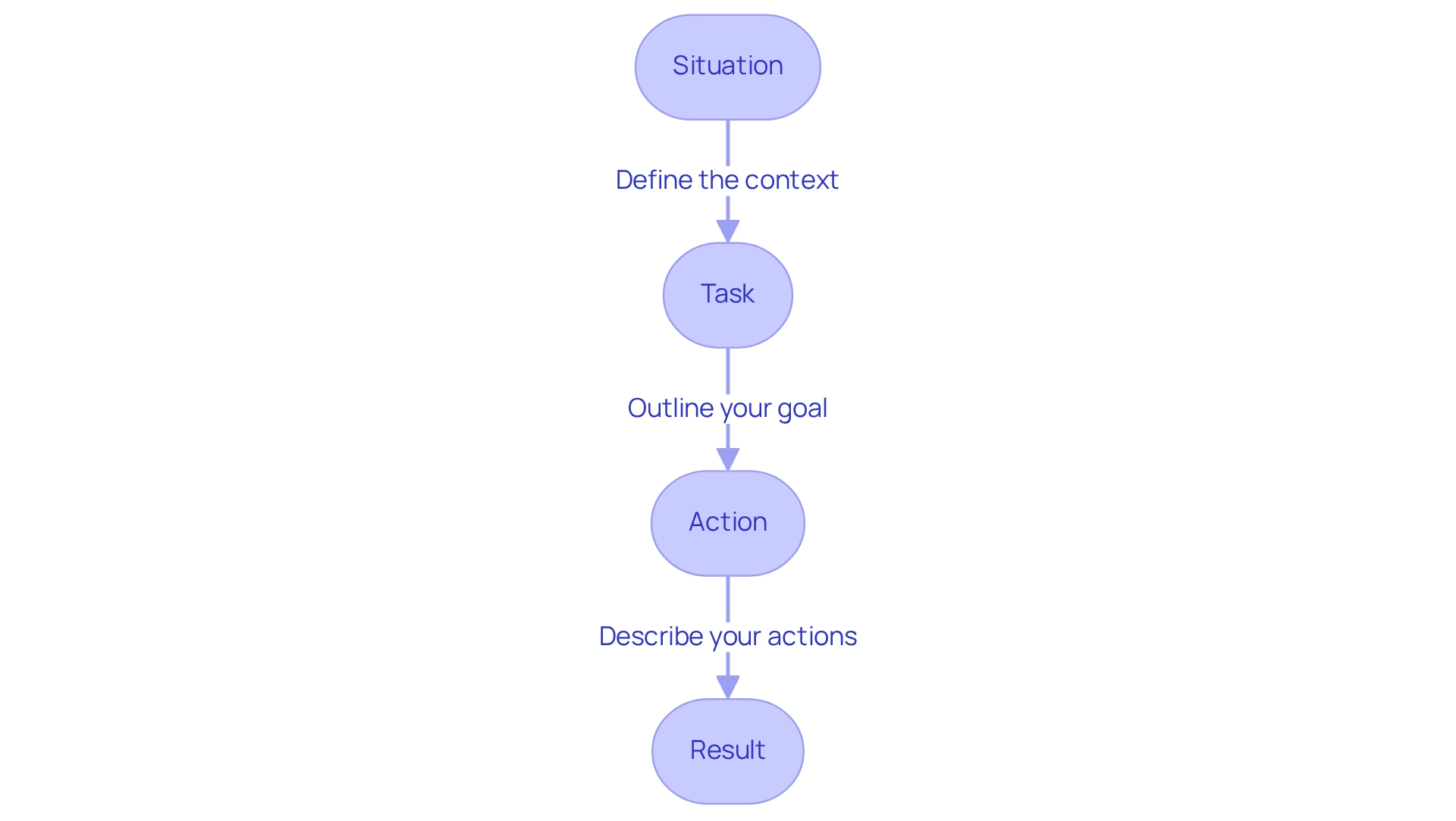
Avoid Common Pitfalls: Present Authentic and Positive Responses
Candidates must be vigilant regarding common pitfalls in job assessments, such as speaking negatively about former employers or providing ambiguous responses. It is imperative to concentrate on delivering authentic and positive replies that showcase individual strengths and experiences. Embracing transparency during the interview process holds significant importance; applicants should be candid about their workstyle preferences, salary expectations, and any unique personal circumstances that provide clarity. For instance, if an applicant has a strong preference for remote work, they should articulate why this arrangement is essential and how they plan to maintain effective communication and collaboration.
Framing answers to highlight personal growth and lessons learned from past challenges can greatly influence interviewers. Statistics reveal that 47% of recruiters dismiss applicants who demonstrate minimal understanding of the organization they aspire to join, underscoring the necessity of comprehensive preparation. This emphasizes the importance of applicants researching the organization beforehand to tailor their responses effectively. Moreover, as noted by career advisors, “40% of interviewers agree that an applicant’s overall confidence affects their hiring decisions,” further reinforcing the need to present oneself authentically and confidently during interviews.
To circumvent common pitfalls, applicants should practice articulating their answers for why you want to work here, making sure their responses are both genuine and aligned with the organization’s values. Honesty regarding any gaps in employment history is also crucial, as providing clear explanations can foster trust with the hiring manager. Sharing personal insights can facilitate a connection with the hiring manager, showcasing authenticity and emotional intelligence. For example, an applicant might recount a personal story about how the company’s mission aligns with their own career aspirations. By doing so, individuals can leave a lasting impression that resonates with interviewers, ultimately enhancing their chances of success. In today’s competitive job market, particularly for millennials facing high rates of unemployment and underemployment, presenting oneself authentically is more critical than ever. Candidates should prepare specific examples of their motivations and personal insights to effectively convey their fit for the role.
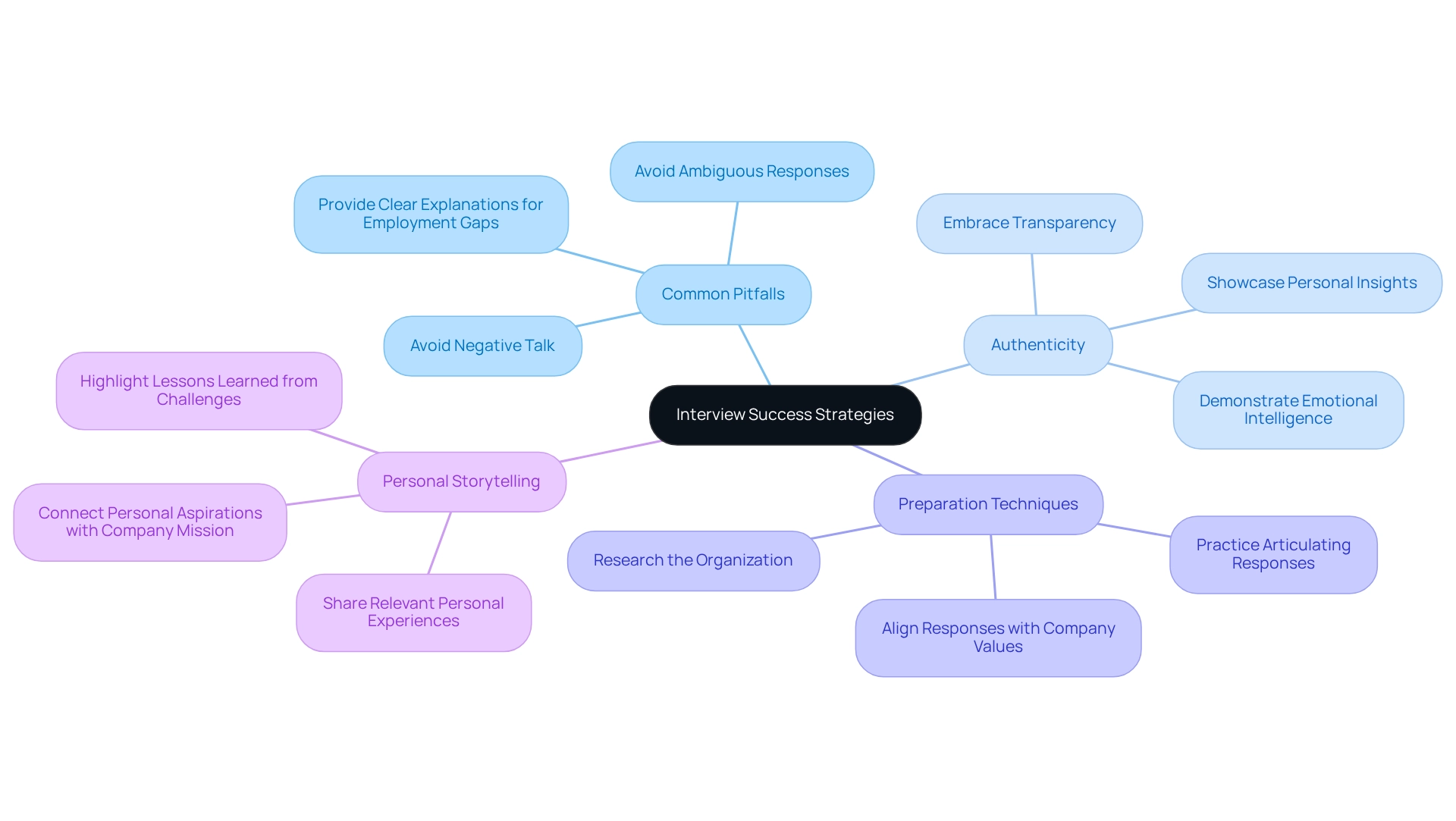
Practice Your Response: Build Confidence and Clarity
Practicing replies to typical questioning is essential for developing both confidence and clarity. Did you know that individuals who prepare adequately have a 5-10% greater chance of securing a job? This statistic underscores the significance of thorough preparation in the recruitment process. Participating in practice sessions with a friend or mentor effectively replicates the assessment setting, enabling individuals to enhance their responses and improve their presentation. Such practice not only decreases anxiety on the actual assessment day but also significantly boosts performance.
Mock sessions serve as an essential tool for job seekers, providing targeted feedback that helps identify gaps in their approach. Career coaches emphasize that dedicating time to practice can lead to substantial improvements in confidence levels. For instance, applicants who frequently engage in practice sessions report feeling more prepared and self-assured during real discussions. As highlighted by Preplaced:
- “We allocate distinct 15-minute slots specifically for feedback at the conclusion of each of our mock discussion sessions,” showcasing an organized method that enhances preparation.
The remarkable track record of achievement for individuals who utilize practice sessions illustrates their effectiveness. Numerous testimonials from successful candidates reveal how this practice has transformed their experiences in job discussions, culminating in successful employment outcomes. By dedicating time to practice sessions, applicants not only boost their abilities but also position themselves as formidable competitors in a challenging job market, ultimately increasing their likelihood of success. Are you ready to elevate your job search strategy? Consider investing in practice sessions to secure your future.
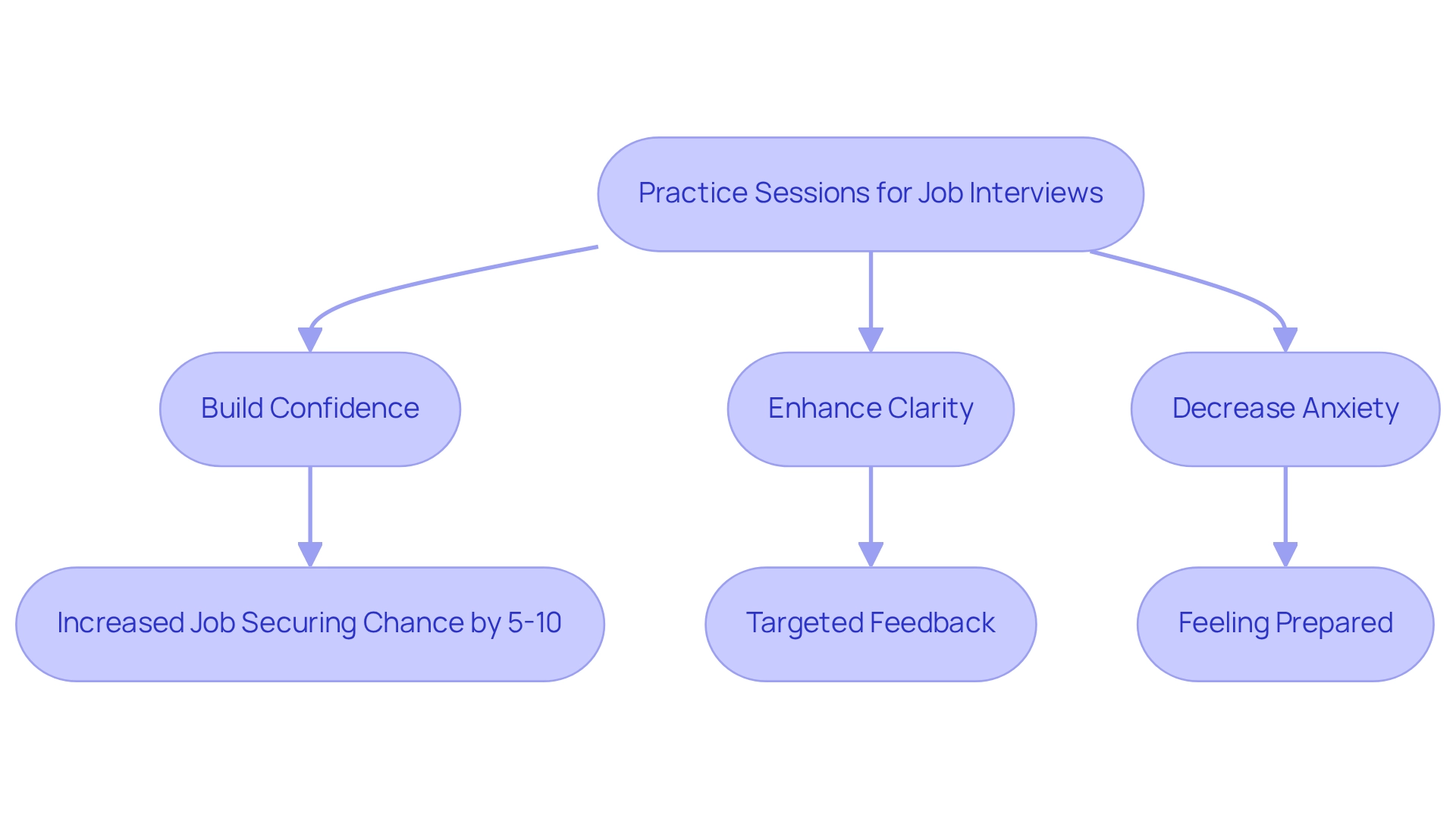
Demonstrate Industry Knowledge: Highlight Company Leadership
Investigating an organization’s standing within its sector—its leadership, recent accomplishments, and obstacles—is essential for applicants to formulate answers for why you want to work here and distinguish themselves in interviews. Engaging in discussions about these topics offers answers for why you want to work here, showcasing genuine interest and reflecting thorough preparation. Candidates who articulate their understanding of the organization’s strategic direction and leadership dynamics position themselves as knowledgeable and proactive applicants, which is crucial in today’s competitive talent landscape, particularly when they provide clear answers for why you want to work here, as demonstrating industry knowledge can significantly influence perceptions of applicants.
For instance, those who give answers for why you want to work here by referencing a firm’s recent accomplishments or leadership initiatives effectively illustrate their alignment with the organization’s objectives. This approach is particularly efficient, especially as smart and innovative individuals are now evaluating organizations as much as they are being evaluated. With 86% of organizations employing advanced virtual technologies for assessments, applicants must adapt and showcase themselves effectively in this evolving environment to avoid red flags that could deter them from pursuing opportunities.
Moreover, comprehending organizational leadership is essential. Nonverbal communication, which constitutes 55% of interaction, plays a vital role in how applicants express their thoughts during discussions. Candidates who confidently discuss leadership styles and their implications for company culture can create a positive impression, reinforcing their suitability for the role. This is especially critical as hiring managers must navigate the selection process smoothly to attract top talent. Ineffective hiring methods can disrupt team dynamics and lower morale, underscoring the importance of applicants demonstrating industry knowledge to mitigate such issues.
Case studies reveal that applicants who effectively showcase industry knowledge often receive favorable assessments. For example, addressing unconscious biases in evaluations through structured conversations about leadership can enhance fairness and improve hiring outcomes. By focusing on these elements, applicants not only elevate their performance during evaluations but also contribute to a more informed and engaged hiring process. Furthermore, candidates should be mindful that live technical assessments can diminish performance by 50%, highlighting the necessity for comprehensive preparation to navigate these challenges effectively.
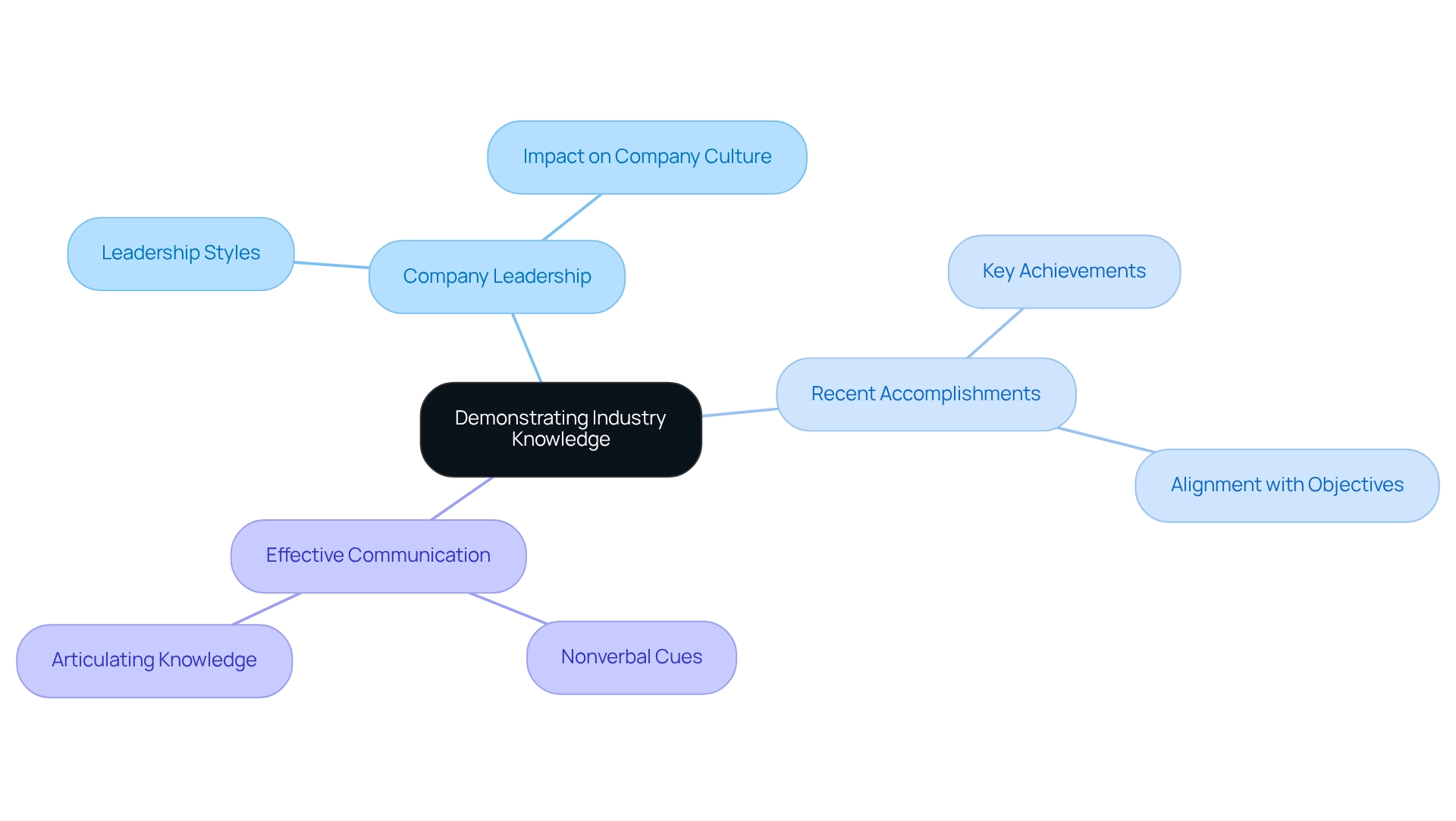
Express Long-Term Aspirations: Align with Company Growth
When discussing your professional objectives in a meeting, it is crucial to demonstrate how they align with the organization’s growth trajectory. Clearly articulate your aspirations for professional development and illustrate how you envision contributing to the organization’s long-term success. This alignment not only showcases your dedication but also reassures employers of your investment in the company’s future.
For instance, candidates can highlight specific skills they aim to cultivate that directly support the company’s objectives, such as enhancing leadership capabilities or mastering new technologies pertinent to the industry. This approach reflects a proactive mindset and a willingness to evolve alongside the organization. Additionally, transparency during the selection process is vital. Candidates should openly communicate their workstyle preferences, clarifying desired work arrangements, whether hybrid, on-site, or remote. If remote work is a priority, provide a comprehensive explanation of why this arrangement is significant and outline how you plan to maintain effective communication and collaboration. Sharing personal insights, while upholding professionalism, can foster a connection with the hiring manager. When candidates provide answers for why you want to work here—whether for career advancement, new challenges, or a change in work environment—they cultivate a sense of authenticity that resonates well with employers. Research indicates that over a third of employees (36%) struggle to achieve their goals due to ineffective feedback, underscoring the necessity of clear communication regarding aspirations. By articulating how your goals align with the organization’s strategic objectives and being candid about your motivations, you can mitigate this challenge and demonstrate your readiness to contribute effectively.
Career coaches emphasize the importance of discussing long-term aspirations during conversations, noting that individuals who convey a clear vision are often viewed more favorably. For example, expressing a commitment to continuous learning and adaptability can resonate positively with employers seeking resilient team members. Furthermore, the American Society of Training and Development found that individuals are 65% more likely to achieve their goals after committing to someone else, highlighting the significance of accountability in reaching both personal and organizational objectives.
Incorporating these elements into your responses not only enhances your appeal as a candidate but also positions you as a valuable asset to the organization, prepared to contribute to its success meaningfully. As Lorelei Trisca, a Content Marketing Manager, points out, staying informed about the latest HR trends and best practices can significantly elevate your interview performance and alignment with organizational culture.
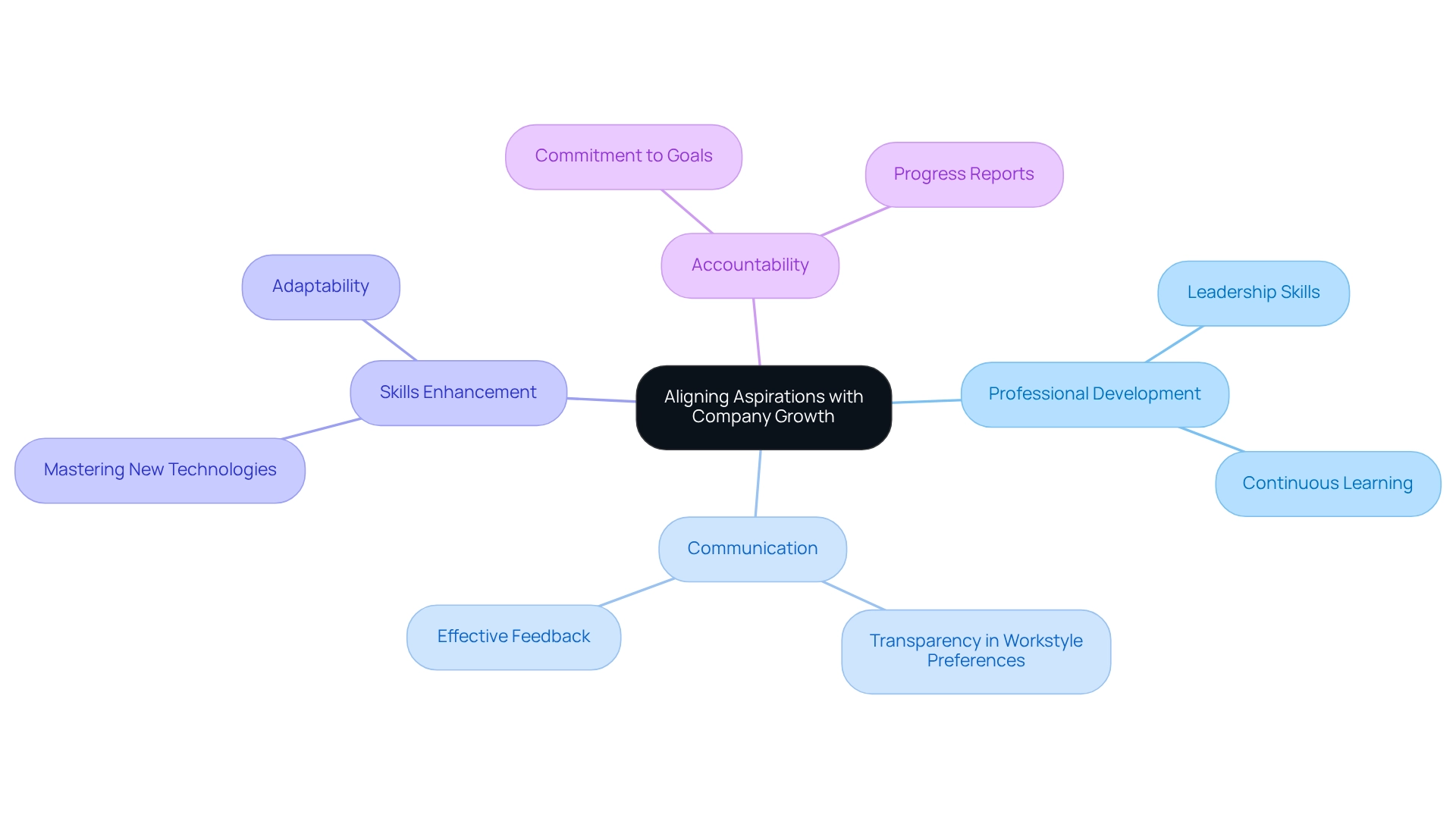
Tailor Your Answer: Address Role-Specific Challenges
Customize your responses to reflect a deep understanding of the specific challenges associated with the role. Did you know that candidates who tailor their responses effectively are perceived as more suitable for the position? This tailored approach not only highlights your suitability for the role but also provides answers for why you want to work here by demonstrating your commitment to understanding the company’s needs.
For instance, if the position emphasizes strong teamwork skills, provide concrete examples of past collaborations that led to successful outcomes. Research indicates that success rates rise considerably through several discussions, with the likelihood of obtaining an offer climbing to 51 percent after three meetings.
Furthermore, addressing teamwork skills is crucial; 67% of workers express a desire for more in-person collaboration post-pandemic, underscoring the importance of demonstrating your ability to work well with others. Additionally, with 60% of job seekers abandoning online applications because of their length or complexity, clarity and conciseness in your communication during discussions become essential.
Remember, while the first job offer may seem appealing, it’s essential to explore all available options and ensure that the role aligns with your long-term career goals. Committing too quickly can lead to regret; therefore, take the time to weigh the pros and cons of each opportunity.
Engaging with Boutique Recruiting can provide personalized support throughout your job search process, helping you make a well-informed decision that leads to a fulfilling career path.
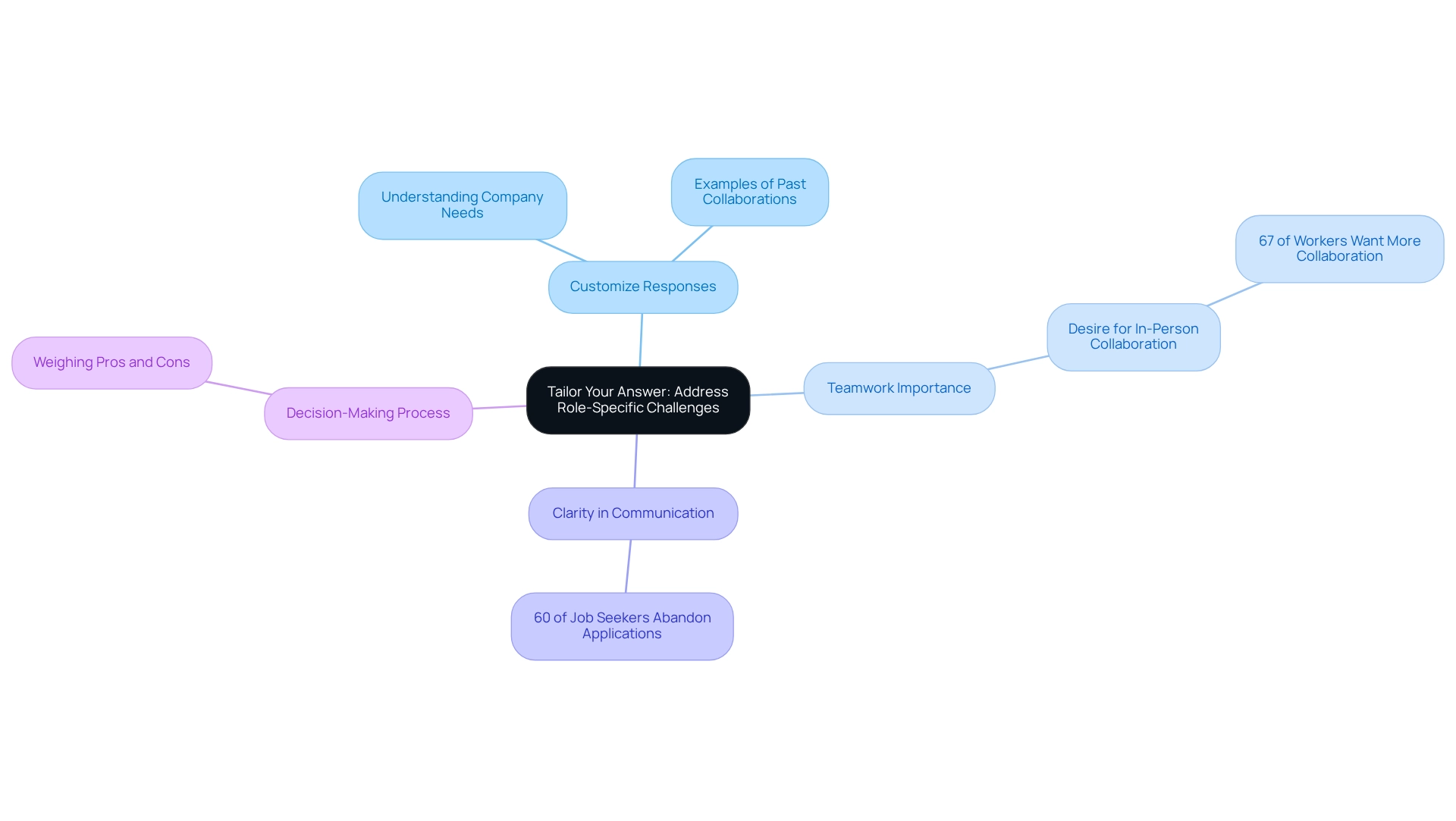
Reflect on Personal Connection: Create a Memorable Response
To create a memorable impact during interviews, think about your answers for why you want to work here and how your personal experiences align with the organization’s mission or values. Sharing a relevant story not only showcases your qualifications but also fosters a memorable connection with the interviewer. For instance, if the organization emphasizes community service, discussing your volunteer efforts can effectively demonstrate your dedication to similar values. This personal touch sets you apart from other applicants and aligns with the interviewer’s desire for individuals who genuinely connect with the organization’s ethos.
Research indicates that personal connections significantly influence hiring decisions, with individuals who share relatable stories often leaving a stronger impact. In fact, storytelling can enhance the conversation experience; 46% of millennials cite a lack of career growth opportunities as a reason for leaving their previous jobs, underscoring the importance of aligning personal aspirations with company values. Furthermore, recognizing that the average duration for the complete selection process varies by job title can assist candidates in managing their expectations. For instance, positions like waiters and retail representatives typically take around 8 days for the interview process.
By reflecting on your own journey and how it intersects with the company’s goals, you can formulate strong answers for why you want to work here that resonate well with interviewers, ultimately increasing your chances of success. As Amanda from Boutique Recruiting illustrates, her dedication to fostering connections with applicants not only boosts their confidence but also ensures a smooth hiring process, which is essential in today’s competitive job market. In a landscape where the very best candidates are evaluating potential employers just as rigorously, standing out through personal storytelling is crucial.
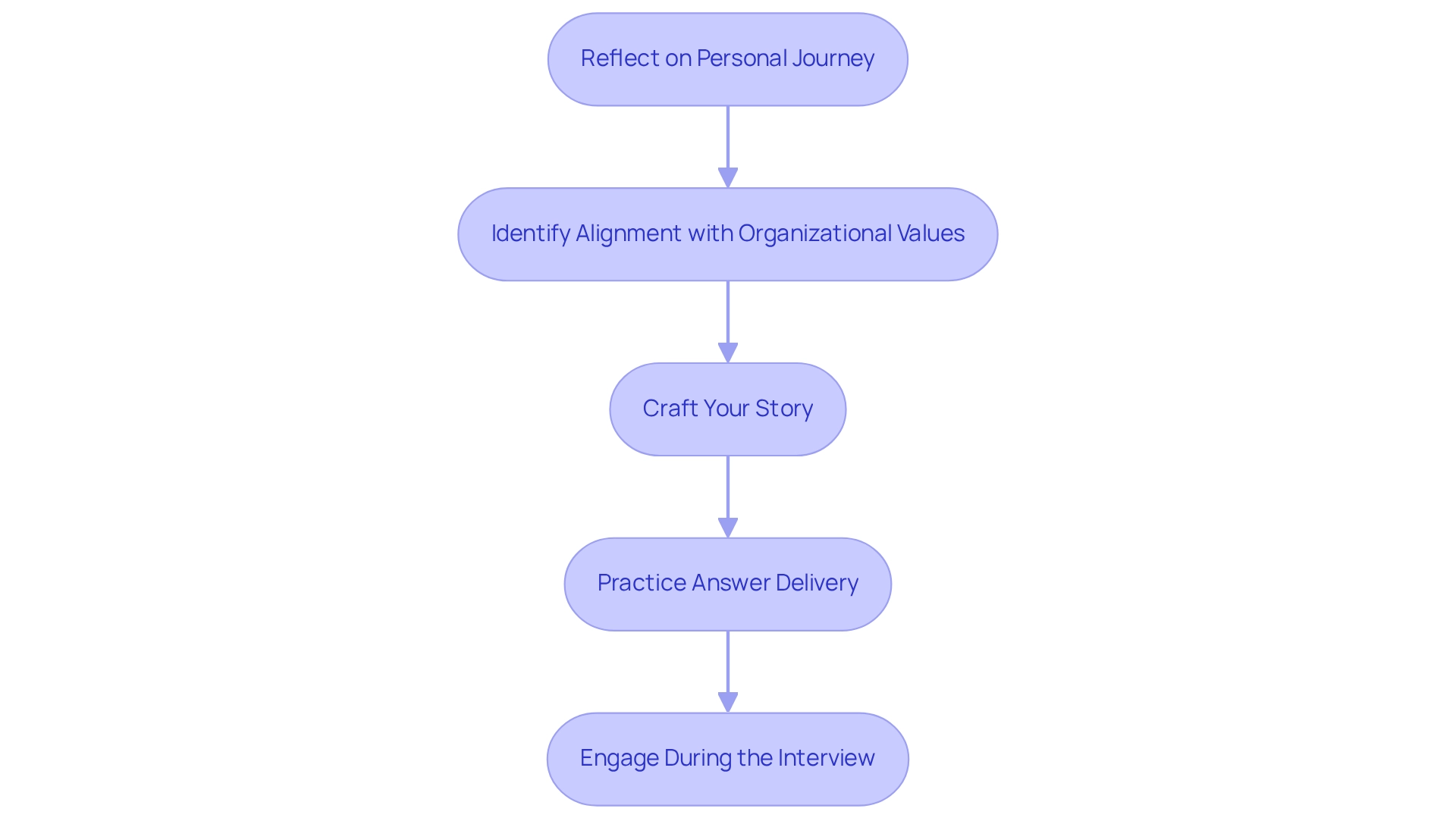
Conclusion
The journey of job searching transcends the mere act of securing employment; it encompasses the forging of meaningful connections that resonate with personal values and career aspirations. Boutique Recruiting distinguishes itself in this competitive landscape by offering tailored recruitment solutions that prioritize the unique needs of both candidates and employers, fostering relationships that lead to long-term success.
Candidates can significantly enhance their interview performance by employing essential strategies such as:
- Researching company values
- Expressing genuine motivations
- Crafting compelling narratives that align their skills with the role’s requirements
By understanding and addressing the specific challenges of each position, candidates can present themselves not only as qualified individuals but also as valuable assets to the organization. Furthermore, transparency regarding personal work preferences and long-term aspirations can create a stronger connection with potential employers, reinforcing the candidate’s commitment to contributing to the company’s growth.
Ultimately, the key to successful job searching lies in the ability to connect personal motivations with organizational goals while demonstrating authenticity throughout the interview process. By embracing these strategies, candidates can navigate the complexities of today’s job market with confidence, ensuring they not only find the right role but also cultivate a fulfilling career that resonates with their values and aspirations. As the landscape of recruitment continues to evolve, the emphasis on personalized approaches and genuine connections will remain paramount in achieving success for both candidates and employers alike.
Frequently Asked Questions
What advantage do organizations using applicant tracking systems (ATS) have over those that do not?
Organizations utilizing applicant tracking systems (ATS) achieve hiring outcomes that are 2-3 times better than those that do not.
How does Boutique Recruiting enhance the recruitment process?
Boutique Recruiting connects high-quality individuals with employers by offering tailored recruitment solutions, emphasizing a deep understanding of the distinct requirements of both applicants and employers.
Why is personalized recruitment important?
Personalized recruitment enhances employee satisfaction and contributes significantly to organizational success by focusing on the specific requirements of each role and the hiring organization’s culture, leading to improved retention and performance.
What do client testimonials say about Boutique Recruiting’s services?
Clients praise Boutique Recruiting for their ability to understand business needs and deliver quality candidates quickly.
How can integrating custom recruitment solutions with existing HR systems benefit organizations?
Integrating tailored recruitment solutions with existing HR systems can optimize hiring processes and ensure that Boutique Recruiting meets and exceeds the expectations of Financial Firm HR Managers.
What should candidates research before an interview?
Candidates should research the organization’s mission, values, and culture to tailor their responses and demonstrate how their personal values align with the organization.
How does alignment of personal values with an organization affect employee satisfaction?
Employees who believe their values correspond with their organization’s are significantly more satisfied and engaged in their roles, leading to better retention.
What should applicants communicate during interviews?
Applicants should be transparent about their workstyle preferences (hybrid, on-site, or remote), salary expectations, and any unique personal situations to position themselves as strong fits for the organization.
How can candidates effectively convey their enthusiasm for a job during an interview?
Candidates can convey enthusiasm by highlighting specific aspects of the position that excite them and sharing personal stories that illustrate their passion for the industry or role.
What should candidates consider regarding job offers?
Candidates should remember that the first job offer may not always be the best and exploring multiple opportunities can reveal roles that better align with their long-term aspirations and growth.
What impact does a positive interview experience have on job offers?
Candidates who have a favorable discussion experience are 38% more inclined to accept a job offer, while 80% have opted out of offers due to poor interview experiences.
Why is it important to prepare thoroughly for the application process?
Thorough preparation ensures a smooth application experience, allowing candidates to focus on showcasing their genuine interest during interviews and enhancing their chances of success.
